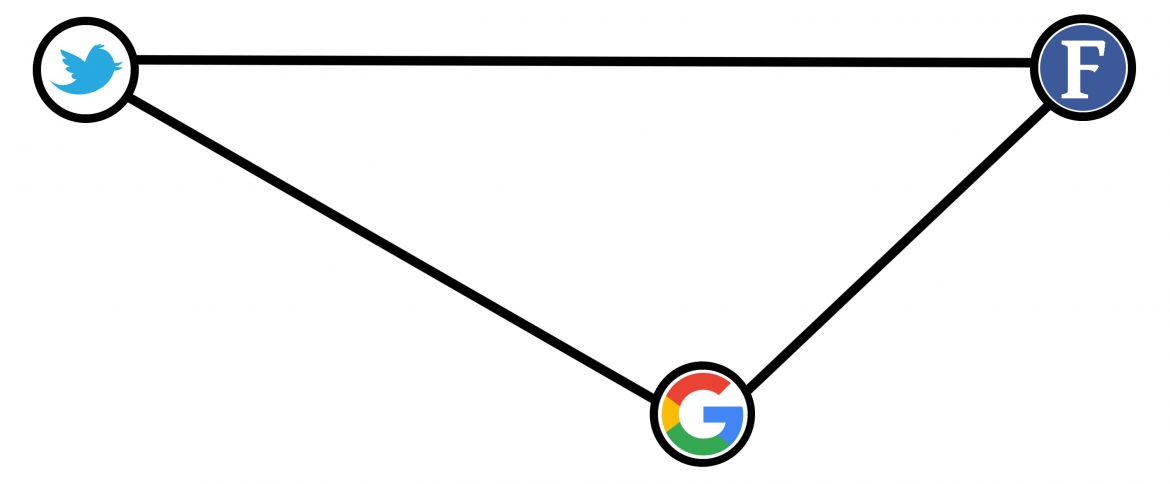This is Part 1 of a three article series on the social media upheaval.
An internet hurricane is unfolding. Since 2016, the world of social media has been undergoing drastic changes. This is thanks to political events, government crackdowns, and intensifying personal biases. Google, Facebook, Twitter, and many other well-known social media companies have become drunk on their power. They are now seeking, with the government’s encouragement, to expand their power. They will be able to watch and influence everyone, becoming the final arbiters of what is true, respectful, and permissible. And they do have the ability to do this. After all, their respective platforms are the de-facto places to go when establishing a social media presence.
This disturbing news is a repeat performance of a historical trend. These actions are symptoms of when governments turn tyrannical and large businesses become monopolies. This should horrify anyone who believes in true freedom of speech and expression as well as privacy rights. The actions of monopolies are terrifying, and not only for their effects in violating online freedom rights. It could have disastrous effects on online freedom over the next few years as threats to regulate online social media platforms may move from fantasy to reality.
Monopolies, as defined by the Merriam-Webster dictionary, are companies which hold exclusive ownership through legal privilege, command of supply or concerted action. Under this definition, the ‘Big Three’ of the social media world – Google, Facebook, and Twitter – are monopolies. Indeed, so are many other platforms: Reddit, Pinterest, LinkedIn, and other ‘mainstream’ social media sites. They hold a privileged position in being the de-facto companies all businesses and individuals turn to when promoting a presence online. With this position comes immense power and with power comes temptation or pressure to abuse the trust placed in them. The trust that everyone’s information is secure. Trust that their privacy is being respected. Trust that they are free to use the social media platform’s services, within the boundaries of natural law, for their own ends, without censorship or reprisal. A betrayal of trust on this scale is deadly to a company’s future once it becomes known.
These major social media companies have shattered the trust of everyday users with their recent run of scandals. Google mines their users’ data in unethical and privacy-invading ways and alters their search algorithms to hide search results. This allows advertisers’ to tailor their services to Google users and government entities or Google tycoons to control the flow of information to their consumers. Facebook unethically collects its data about users to allow political campaigns to target sympathetic voters. Youtube punishes channel hosts whose views run contrary to their own or to the government narrative; either engaging in censorship or demonetization to discourage any further deviation of the channel hosts. Twitter shadowbans users whose views they do not approve of, limiting and censoring views deemed “unpopular” or “offensive.” These “unpopular” and “offensive” topics range from the Seth Rich case and the Parkland shooting to simple messages about the Pro-Life cause.
Finally, a significant number of the so-called ‘mainstream’ platforms have launched a joint campaign to obliterate the outreach capabilities of several alternative news sites and opinion platforms. Controversial radio host Alex Jones and his popular news brand ‘Infowars’ was first censored, then expelled in August and September of 2018. Following this in October 2018 was the de-platforming, expulsion or suspension of several viable alternative news sites and users advocating alternative viewpoints. This list included sites such as the Free Thought Project, the Anti-Media, Press for Truth, Cop Block, LifeSiteNews and others. It even extended as far as a few reputable individuals. In most of these cases, the reasons given for the expulsions were vague with no specific examples. In other cases, the expulsion could only have been for actions taken outside of the platform; a dangerous dictatorial precedent.
These acts should alarm all true believers in freedom of speech and expression. It is a mark of tyranny disguised behind the mask of corporate rights. You can agree or disagree with the views of Alex Jones, LifeSiteNews or any of the others. However, the mere fact that the social media monopoly has the ability to so completely shut down any outreach should show that it is a matter of time before a similar ban occurs to others the monopoly–or their government overlords–disagree with.
All these actions are clear and deliberate signals that the social media monopoly has come to believe they are invincible and can never fail. This is a common mistake made by those who rise to such dizzying heights of power. At a glance from those inside and outside the monopoly, it can appear that these companies are impregnable. It may appear that they will never be brought to account for their blatant violation of individual rights. A closer analysis of past examples in history proves that they are neither. Whether it is nations or organizations which have risen to such heights, such actions as those taken by the monopoly are clear signs of the beginning of the end of their dominance.
Throughout history, great political and economic empires have always arisen as discovered for themselves a unique niche which they filled well. They then rise to dizzying heights of power based on how well they filled that need. Drunk off the power they have acquired, corruption sets in soon after and they begin to abuse that power, making decisions based on personal gain rather than moral prowess. This then turns the ordinary people against them, leading to a deterioration of the empire. The empire then uses certain actions to try and prop up their power. Political empires advocate wars and economic empires choke their citizens with regulations and so-called bailouts. Eventually, with overbearing weight at the top and without the support of everyday citizens at the bottom, the empire topples.
The social media monopoly are in the stage where their empire has become rotten. Their actions are classic signs that corruption has seeped deep into the structures of their empires. Taking these actions at all was dangerous. To any logical person, it should have been obvious that the news would get out and lead to people abandoning the platforms. Thus, the social media monopoly’s actions were really an act of suicide. The time has come to make them pay the price of that act. The bill has come due.
The danger to online freedom is now. The time has come for all who care about their freedoms and privacy to take part in using the market forces to reign in the companies who have abused the public trust. Regulation is not the solution; private companies have the right to set their own terms of service and so cannot technically violate freedom of speech. Ability is not permission, however, and this does not make the actions of the monopoly right. It discourages free expression and personal responsibility. The monopoly’s actions are bad for the culture itself. So, since regulation is impossible where the companies have the technical right, society itself should reject the companies that engage in these actions.
Regulation will do nothing but prolong the wait for the social media monopoly’s Day of Judgment. The monopoly will be in prime financial positions to accommodate any government regulations imposed. The monopoly’s competitors will not. The competition’s growth will be destroyed, prolonged or stunted while the mainstream media gets off with a metaphorical slap to the wrist. Thus, bringing the end to the social media monopoly lies with the everyday citizens who use social media services. They must use the free market practice of abandoning the monopoly’s platforms. They should turn to the new alternative media platforms which have learned from the mistakes of the social media monopoly. This is the true future of online freedom.
Be sure to read Part 2 and Part 3 to this article series to get the WHOLE story!
© 2018 Grant Dahl & On This Terrestrial Ball. All rights reserved. This material may not be re-published, re-broadcast, re-written or re-distributed without permission from the author of this piece.




